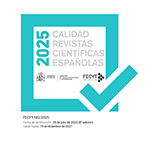Contextualized Cultural Heritage Management: Reflexions on your Possibilities Beyond Tourism
Abstract
It is common domain that the institutional processes of intervention on archaeological heritage, in developing countries, have their main impulse in tourism. This situation is not only motivated by public or private managers who presume the multiple benefits, mainly economic, that this would produce where it arises, but is also part of the imaginary of the common citizen. From this perspective, a large part of the initiatives orient their different actions towards the development of the so-called enhancement, structured towards tourist consumption, and, in a subordinate way, towards a more or less standard patrimonialization process. Which directs its main efforts towards the qualification and management of cultural heritage thinking about the needs and sensitivities of tourism, forgetting or subordinating the needs and interests of people who cohabit or are in adjacent territories. From these reflections, we will focus on conducting a historical analysis of the role assigned to heritage in the policies, actions and speeches. To then explore the possibilities that a contextualized cultural heritage management perspective can offer, centered on the inclusion of the inhabitant of the environment for the exercise of their cultural and recreational rights.
Downloads
Article download
License
In order to support the global exchange of knowledge, the journal Complutum is allowing unrestricted access to its content as from its publication in this electronic edition, and as such it is an open-access journal. The originals published in this journal are the property of the Complutense University of Madrid and any reproduction thereof in full or in part must cite the source. All content is distributed under a Creative Commons Attribution 4.0 use and distribution licence (CC BY 4.0). This circumstance must be expressly stated in these terms where necessary. You can view the summary and the complete legal text of the licence.










